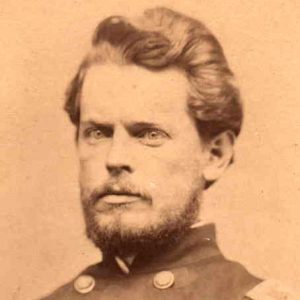calsfoundation@cals.org
William Ward Orme (1832–1866)
A friend of Abraham Lincoln, William Ward Orme served in the Union army during the Civil War and commanded a brigade in Arkansas at the Battle of Prairie Grove.
Born on February 17, 1832, in Washington DC, Orme was the son of William Clarke Ward and Jane Frances Ward. Both of his parents died in the 1840s, and Orme was raised by an uncle. After attending Mount St. Mary’s College in Emmitsburg, Maryland, Orme moved to Chicago in 1849. He worked in a bank for a time then moved to Bloomington, Illinois, where he obtained a position in the circuit clerk’s office. Passing the bar in 1852, he joined the law office of Leonard Swett, a friend of Abraham Lincoln. Multiple sources claim that Lincoln called Orme “the most promising lawyer of his age in the state.”
Orme married Nancy (Nannie) McCullough in 1853, and the couple had four children.
Orme was active in the Republican Party and supported Lincoln’s presidential campaign. With the organization of the Ninety-fourth Illinois Infantry Regiment in the summer of 1862, Orme received command of the unit with the rank of colonel. The unit immediately moved to Missouri and began active service in the field. Joining the Army of the Frontier under the command of Brigadier General John Schofield, the regiment was placed in a brigade under Brigadier General Francis Herron.
In short order, Orme received command of the brigade in which his regiment served when Herron moved up to divisional command. Orme led the brigade into Arkansas with other elements of the Army of the Frontier and received praise from his superiors for his actions at the Battle of Prairie Grove on December 7, 1862. Some of the men under his command did not agree with those assessments, however, claiming that he focused too much on the actions of his former regiment during the battle and protected it by keeping the unit in reserve. The brigade lost a total of forty-nine men killed, 185 wounded, and fourteen captured or missing, for a total of 248 casualties, the second-highest loss suffered by a Federal brigade in the battle.
His performance during the engagement was positive enough that he received a promotion to brigadier general on March 13, 1863, backdated to November 29, 1862. Orme led his brigade in various movements in northern Arkansas and Missouri over the next several months, but Herron’s entire division was transferred to Mississippi in June 1863 to participate in the Siege of Vicksburg. After the fall of that city, Herron’s division participated in the capture of Yazoo City, Mississippi, and Orme’s brigade occupied the town after capturing the Confederates defending the city.
While serving in Mississippi, Orme fell ill with tuberculosis and returned to Illinois. Some sources report that the illness affected his service before the Vicksburg Campaign, but the impact of the disease prevented his return to the field after November 1863. He served as the commander of prisoner-of-war facility Camp Douglas in Chicago for five months in late 1863 and early 1864, although the weather in Chicago did not improve his health. Orme resigned from the army on April 20, 1864.
Lincoln appointed Orme as a special agent with the Treasury Department with a posting in Memphis, Tennessee, and he held that post until November 1865. Upon his resignation, Orme returned home to Bloomington. He died on September 13, 1866, and is buried in Evergreen Memorial Cemetery in Bloomington.
After Orme’s death, Nancy married Dr. Dunbar Dyson in 1876. He died in 1893, while Nancy died in 1912. She is buried with Orme, with Dyson buried nearby. A monument to Orme stands in Vicksburg near Orme Drive, outside of the military park.
For additional information:
Pratt, Harby E., Wm. W. Orme, and F. J. Herron. “Civil War Letters of Brigadier General William Ward Orme—1862–1866.” Journal of the Illinois State Historical Society 23, no. 2 (1930): 246–315.
Shea, William L. Field of Blood: The Prairie Grove Campaign. Chapel Hill: University of North Carolina Press, 2009.
Warner, Ezra. Generals in Blue: Lives of the Union Commanders. Baton Rouge: Louisiana State University Press, 2002.
David Sesser
Southeastern Louisiana University


 William Ward Orme
William Ward Orme 



Comments
No comments on this entry yet.